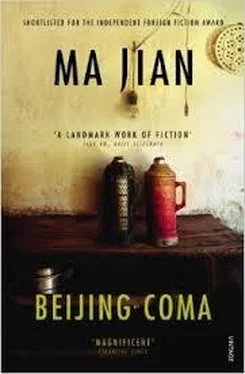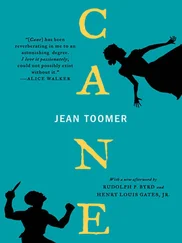‘You once told me that if you’re afraid of being sent to jail, you shouldn’t join the revolution,’ he said.
‘We didn’t manage to depose Deng Xiaoping in ’87,’ Mou Sen said. ‘This time we mustn’t give up until he steps down.’ Then he turned to Shi Ye and said, ‘Sorry, I won’t be long. I just need to write the last paragraph.’
‘The word “jail” makes my blood run cold,’ Nuwa said. She switched on the light. The naked light bulb’s soft glimmer had the same calming effect on us as Nuwa’s beauty.
‘Being sent to prison isn’t that bad,’ Tang Guoxian said. ‘You get let out in the end, after all. It’s capital punishment I’m afraid of. Before the police execute a convict, they tie him to the back of a motorbike and drag him through the streets until all the flesh has been torn from his arse.’
‘That’s horrible!’ Nuwa shrieked, then glanced at Mou Sen, a little embarrassed by the noise she’d made.
‘What’s the matter with you, Tang Guoxian?’ Tian Yi said. ‘Stop scaring everyone.’
‘Hey, Dai Wei, I spoke to A-Mei on the phone last night,’ Shi Ye said. ‘She’s been appointed general secretary of the Association of Chinese Students in Canada. She said she’ll be coming to Beijing in a few days. She wanted me to let you know.’
I felt very awkward. Shi Ye didn’t know that Tian Yi was my girlfriend. As I’d expected, Tian Yi looked up and shot me a suspicious glance.
‘If she’s coming, she’s coming. What’s it got to do with me?’ My expression didn’t feel right. I wanted to run away.
‘But you specifically asked me to get in touch with her,’ Shi Ye said, eyeing me over the top of her glasses.
Mou Sen rushed over and said, ‘Let’s be off, Shi Ye!’, pinching my arm furtively as he dragged her outside.
I tried to dig myself out of the hole. ‘I haven’t heard from A-Mei since we broke up, Tian Yi,’ I said. ‘I was only wondering what had happened to her. Don’t read anything into it.’ As I’d hoped, she didn’t want to make a scene in front of the others, so she kept her eyes fixed on the script on her lap and said nothing. I mumbled that I needed to fetch some more ink and quickly left the tent.
You wander across the wastes, searching for a patch of earth in which to bury yourself. You can no longer resist the desire to let your body disintegrate into dust.
‘He died five days ago, but the funeral dirges are still being played over the radio,’ my mother says into the telephone.
Deng Xiaoping has died. The man who robbed me of my life is dead. But my hatred for him died long ago.
The twelfth episode of a documentary series on Deng Xiaoping’s career is booming from the television. I wish my mother would turn it off. My old dorm mate Mao Da has telephoned to tell her that Han Dan has been released from prison and is planning to move to America.
Last week, she read out a letter from Wang Fei that had news of my old classmates. I learned that, since escaping to Hong Kong together, Wu Bin and Sun Chunlin have gained political asylum in France. I wonder how Sun Chunlin managed to convince the French authorities that he was an activist. He was never interested in politics. His contribution to our movement was purely financial. Wu Bin didn’t have many friends. I suppose Sun Chunlin was the only guy willing to escape the country with him.
Tang Guoxian was one of the twenty-one student leaders on the government’s most-wanted list. To evade arrest, he spent a year as a fugitive, living among peasants in northern China. Then he fled over the Soviet border, crossed the frozen wastes of Siberia and Eastern Europe until eventually finding refuge in Germany. His years of marathon training were probably a good preparation for this epic journey.
‘Perhaps after the tenth anniversary of the crackdown, the political climate will relax a little,’ my mother says to Mao Da. ‘But for the moment, it’s probably best if you didn’t visit. Since Tian Yi spoke to the American press about what happened to Dai Wei, I haven’t been allowed to remove him from the flat. I’ve only just managed to get special dispensation to take him to a hospital in Hebei.’
She puts down the phone then dials another number. I can’t work out who she’s speaking to this time. ‘… I know, those wedding photography studios are popping up everywhere now. A former colleague of mine from the opera company has opened one. She’s invested 200,000 yuan. I went by the other day. She’s employed a photographer with a long ponytail. He really looks the part. The studio’s in a prime spot on Wangfujing Street. Huh! If I didn’t have to look after this wooden son of mine, I could work there as a make-up artist. It would be nice to be able to earn some money. I don’t know how we’ll survive when my cash runs out. We’ll just have to drink the north-east wind, as they say…’
Like a thick cotton thread caught in the eye of a needle, you remain trapped inside your skin.
The floor of the hospital room has been sprinkled with disinfectant, but I can still smell the odour of sickness from the previous patient.
This military hospital is on the outskirts of a town in Hebei Province. Hot gusts of wind blow out from between the town’s tall buildings and rush through the hospital corridors, while humid air from the irrigated fields beyond drifts sluggishly into the room. It’s early May, but the heat is already stultifying.
Whenever it rains, my skin remembers Wen Niao, and the sour scent she left in the flat after each visit. When she was with me, I felt I could see the sky and the earth and everything in between: houses, bookshops, cinemas. I could touch things, taste them, hear them. I could even run down Changan Avenue again and get struck in the head by a bullet.
The room my mother and I are staying in is on the ground floor. The wealthy colliery boss who will receive my kidney is in a room further down the corridor. He’s paying the hospital 150,000 yuan for the transplant, and my mother 8,500 yuan for the kidney — only five hundred yuan more than the provisionally agreed price.
I can hear nurses pacing across the floor above. Their rubber soles make a horrible squelching noise. It sounds as though they’re treading on rotten cabbage leaves. A nurse comes in every night to give me an injection. I have to lie here and submit myself to fate, just like the executed convict we dissected at Southern University. The necessary tests have been completed. All I can do now is wait for the surgeons to wheel me into the operating room and cut me open.
At night, when everyone has gone to sleep, I can hear gnats and mosquitoes fluttering around the light bulb or crashing repeatedly against the windowpane.
I hear a plane slicing noisily through the sky.
My mother walks in with a group of people who smell of alcohol solution.
‘Does he have a blood donor card?’
‘No.’
‘If he did, the blood would only cost you three hundred yuan a bag instead of five hundred.’
‘How many bags will he need for this operation?’
‘At least four…’
The nurses take off my clothes and lift me onto a wheeled stretcher. I can feel the cool canvas against my bare skin. Two or three pairs of hands prod my stomach and the small of my back. Then a sheet is draped over me and I’m wheeled out of the building. The sheet slips to the side, exposing my face and chest to the sunlight. My pores quickly open and soak up the fresh air.
But I’m soon taken into another corridor. My senses seem more alive now. I can picture the wooden door my stretcher bangs into and the smooth concrete floor. The images are so vivid I almost feel as if I’m walking along the corridor with my eyes open.
When I’m wheeled into the air-conditioned operating room, my pores quickly close up again. A nurse takes out my medical records. ‘It says here he was first admitted to hospital on — I can’t make out the date — suffering from a blood clot in the brain. He had a slow pulse and low skin temperature… After the clot was surgically removed, the head wound became infected…’
Читать дальше












